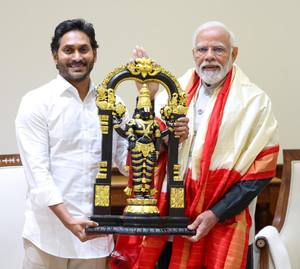Amaravati/New Delhi: Andhra Pradesh Chief Minister Y.S. Jagan Mohan Reddy called on Prime Minister Narendra Modi at his chambers in Parliament on Friday and requested him to expedite several issues related to the state.
Reminding the Prime Minister that the Finance Ministry has already agreed to remove component-wise expenditure ceiling on Polavaram Project and release Rs 12,911 crore for its first phase completion, he urged him to get Cabinet approval for the two pending issues.
According to a statement from Chief Minister’s Office (CMO), Jagan Mohan Reddy also urged the Prime Minister to release, on a priority basis, Rs 17,144 crore for speedy completion of the first phase of Polavaram project, the proposal of which was pending in the Jal Shakti Ministry.
He further sought immediate steps from the Centre to ensure the release of Rs 7,230 crore arrears by the Telangana government to APGENCO for the power supplied to it for three years from 2014.
The Chief Minister also urged him to grant special status to Andhra Pradesh and implement other assurances given at the time of bifurcation as it helps the state attract investments for industrial development and improve employment opportunities.
He further sought Centre’s financial support for the 17 new medical colleges out of which classes have commenced in five colleges and the rest are under construction.
The Chief Minister also urged the Prime Minister to grant necessary funds for the 55-km six-lane highway that connects Visakhapatnam city with Bhogapuram International airport via Bhogapuram, Bhimili, Rishi Konda, and Visakhapatnam Port. He also further urged that the Visakhapatnam-Kurnool high speed corridor proposed in the Andhra Pradesh Bifurcation Act be extended to Bengaluru via Kadapa, and as part of this, new railway line should be laid connecting Kadapa, Pulivendula, Mudigubba, Sri Satya Sai Prasanthi Nilayam and Hindupur for providing proper connectivity to the backward Rayalaseema.
The Chief Minister also appealed that the Visakha Metro Rail Project be approved at the earliest.
–IANS


Comments are closed.